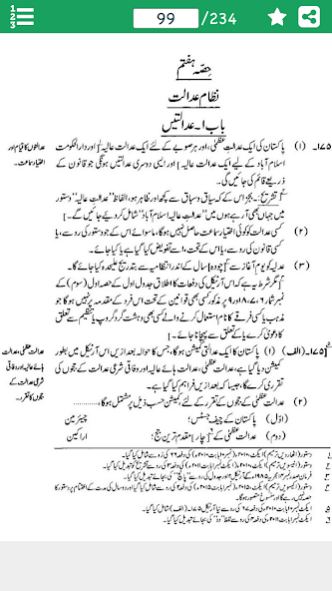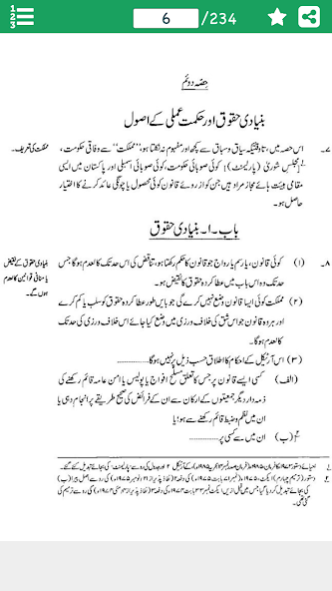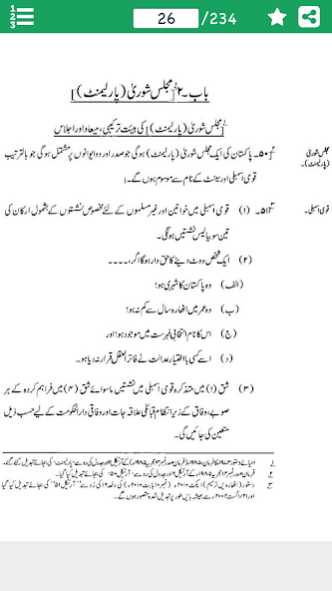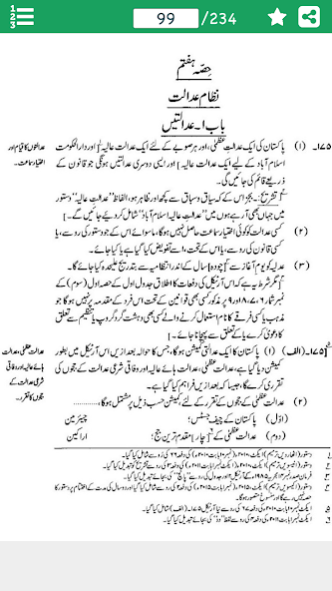Constitution of Pakistan Urdu 1.0
Free Version
Publisher Description
The Constitution of the Islamic Republic of Pakistan (Urdu: آئین پاکستان), also known as the 1973 Constitution, is the supreme law of Pakistan. Drafted by the government of Zulfiqar Ali Bhutto, with additional assistance from the country's opposition parties, it was approved by the Parliament on 10 April and ratified on 14 August 1973. The Constitution is intended to guide Pakistan's law, its political culture, and system. It identifies the state (its physical existence and its borders), people and their fundamental rights, state's constitutional law and orders, and also the constitutional structure and establishment of the institutions and the country's armed forces. The first three chapters establish the rules, mandate, and separate powers of the three branches of the government: a bicameral legislature; an executive branch governed by the Prime Minister as chief executive; and an apex federal judiciary headed by Supreme Court. The Constitution designates the President of Pakistan as a ceremonial Head of State who is to represent the unity of the state. The first six articles of the constitution outline the political system as federal parliamentary republic system; as well as Islam as its state religion. The Constitution also encapsulates provisions stipulating the legal system's compliance with Islamic injunctions contained in the Quran and Sunnah.
The Parliament cannot make any laws which may be repugnant or contrary to the Constitution, however the Constitution itself may be amended by a two-thirds majority in both the houses of the bicameral Parliament, unlike the previous legal documents of 1956 and 1962. It has been amended over time, and most recent impulses for political upgrades and reforms has been amended. Although enforced in 1973, Pakistan, however, celebrates the adoption of the constitution on 23 March—when the first set was promulgated in 1956—each and every year as Republic Day. Technically there are 26 amendments but 23 amendments were made in constitution and three were not passed by the parliament.
The individual Articles of the Constitution are grouped together into the following Parts:
Preamble
Part I – Introductory [Articles 1–6]
Part II – Fundamental Rights and Principles of Policy [Articles 7–40]
Part III – The Federation of Pakistan [Articles 41–100]
Part IV – Provinces [Articles 101-140A]
Part V – Relations between Federation and Provinces [Articles 141–159]
Part VI – Finance, Property, Contracts and Suits [Articles 160–174]
Part VII – The Judicature [Articles 175–212]
Part VIII – Elections [Articles 213–226]
Part IX – Islamic Provisions [Articles 227–231]
Part X – Emergency Provisions [Articles 232–237]
Part XI – Amendment of Constitution [Articles 238–239]
Part XII – Miscellaneous [Articles 240–280]
Schedule
Schedules are lists in the Constitution that categorise and tabulate bureaucratic activity and policy of the Government.
First Schedule – Laws exempted from the operation of Article 8(1), 8(2), 8(3b), and 8(4)
Second Schedule – Election of President" Article 41(3)
Third Schedule: – Oaths of Office: Article 42, Article 91(5)–92(2), Article 53(2)–61,
Fourth Schedule: – Legislative Lists
Fifth Schedule: – Remuneration and Terms and Conditions of Service of Judges: [Article 205]
Unlike the previous documents, the Constitution cannot be changed, instead constitutional amendments are passed; altering its effect. Amendments to the Constitution are made through the Parliament, where a Two-thirds majority and voting is required in both houses for a constitutional amendment to take its effect, in accordance to the Constitution.
Understanding Constitution of Pakistan may be helpful in qualifying various exams like Central Superior Services (CSS), Provincial Management Service (PMS), Assessment Exams, NTS, FPSC General Recruitment Test, Punjab Public Service Commission, PPSC, ISSB, PMA, PNA and various other exams.
About Constitution of Pakistan Urdu
Constitution of Pakistan Urdu is a free app for Android published in the Teaching & Training Tools list of apps, part of Education.
The company that develops Constitution of Pakistan Urdu is Pak Appz. The latest version released by its developer is 1.0.
To install Constitution of Pakistan Urdu on your Android device, just click the green Continue To App button above to start the installation process. The app is listed on our website since 2022-02-07 and was downloaded 0 times. We have already checked if the download link is safe, however for your own protection we recommend that you scan the downloaded app with your antivirus. Your antivirus may detect the Constitution of Pakistan Urdu as malware as malware if the download link to com.PakApps.Constitution is broken.
How to install Constitution of Pakistan Urdu on your Android device:
- Click on the Continue To App button on our website. This will redirect you to Google Play.
- Once the Constitution of Pakistan Urdu is shown in the Google Play listing of your Android device, you can start its download and installation. Tap on the Install button located below the search bar and to the right of the app icon.
- A pop-up window with the permissions required by Constitution of Pakistan Urdu will be shown. Click on Accept to continue the process.
- Constitution of Pakistan Urdu will be downloaded onto your device, displaying a progress. Once the download completes, the installation will start and you'll get a notification after the installation is finished.



